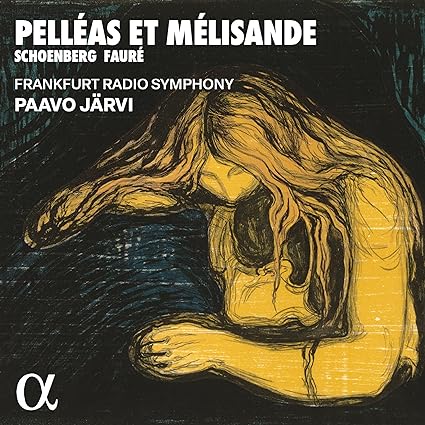

Arnold Schoenberg (1874-1951): Pelleas und Melisande, Op. 5 Gabriel Fauré (1845-1924): Pelléas et Mélisande Suite, Op. 80
I wonder if Maeterlinck realized how closely his 1898 French symbolist play matched the artistic zeitgeist as the 19th century drew towards its end. Over the next 7 years, it provided the inspiration for 4 major composers, the two on this release, and in addition Jean Sibelius and of course Debussy's masterly opera. On this release we have two fascinating extremes. There is the mammoth pre-atonal orchestral tone poem by Arnold Schoenberg, much like an orchestral Gurrelieder, with a generous length, taking up just more than 2/3rds of the release. It is sumptuously orchestrated and gloriously overwrought. And then there is Gabriel Fauré's gentle Suite, from the composer who epitomizes a 'Less is More' understated poetic.
The conjunction shows ideally how the classical world was nearing its tumultuous stylistic splits as the 20th century drew near, splits accelerated by the devastation of the First World War. After that conflagration, European musical civilization (including Schoenberg himself) turned away from the sumptuous velvet clad orchestral textures toward neoclassical, atonal, and more satirical styles as major social changes continued to unsettle musical and wider society in Europe.
I grew up listening to Karajan's famous performance of the Schoenberg (variously coupled now but originally released in a collection of Schoenberg, Berg and Webern orchestral pieces). Never a favorite conductor of mine, I found Karajan gave a very compelling recording, as he did with a controversial recording of Debussy's opera some years later. However, I have to say that I prefer this current release. The recording is more analytical, the textures maybe not quite so thickly velvety, but richer and clearer. The orchestra makes some impressive sounds, and the Alpha engineers give an impressively wide dynamic range in the recording. You really do feel the massiveness of the climaxes, and the contrast with the gentler episodes.
The Schoenberg feels harmonically driven rather than melodically, in the sense that there are memorable textures rather than memorable melodies. This places a greater value for me on the need for clarity in orchestral character. This is delivered very well in this release, with excellent playing from the Frankfurt orchestra.
The Fauré Suite that follows enables the orchestra to demonstrate its ability to play a gentler style, an ideal example being the well-known and coolly Gallic Sicilienne with flute and cello solos emerging clearly often with a harp background, but not obtrusively. The Suite really is a perfect palate cleanser after the Schoenberg, the overarching style changing from excess and desperate emotion to a poised fastidiousness. Overstatement to understatement. The Fauré was also of course incidental music for a performance of the play, and in that sense, there was less opportunity for the broad length and languorous emotional weight displayed in the Schoenberg, but it also fits Fauré's style much more. It's really a clever piece of programming, conventionally one might have expected the gentler and shorter piece to be first.
This release then is right in the 'Järvi sweet spot' for me ... while father, brothers and sister support a very broad repertoire (what a musical family!), I have usually had highest enjoyment from their performances of richly tapestried later 19th and early 20th century works, and this release is firmly in that bailiwick.
Ian Orbell - July 2024 Gabriel Fauré - Sicilienne